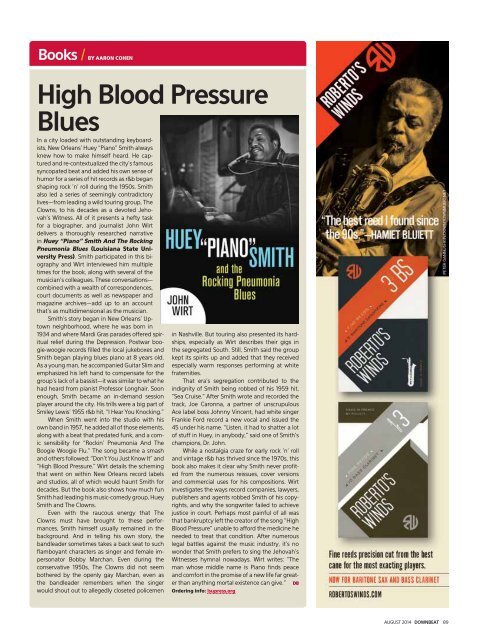You also want an ePaper? Increase the reach of your titles
YUMPU automatically turns print PDFs into web optimized ePapers that Google loves.
Books / BY AARON COHEN<br />
High Blood Pressure<br />
Blues<br />
In a city loaded with outstanding keyboardists,<br />
New Orleans’ Huey “Piano” Smith always<br />
knew how to make himself heard. He captured<br />
and re-contextualized the city’s famous<br />
syncopated beat and added his own sense of<br />
humor for a series of hit records as r&b began<br />
shaping rock ’n’ roll during the 1950s. Smith<br />
also led a series of seemingly contradictory<br />
lives—from leading a wild touring group, The<br />
Clowns, to his decades as a devoted Jehovah’s<br />
Witness. All of it presents a hefty task<br />
for a biographer, and journalist John Wirt<br />
delivers a thoroughly researched narrative<br />
in Huey “Piano” Smith And The Rocking<br />
Pneumonia Blues (Louisiana State University<br />
Press). Smith participated in this biography<br />
and Wirt interviewed him multiple<br />
times for the book, along with several of the<br />
musician’s colleagues. These conversations—<br />
combined with a wealth of correspondences,<br />
court documents as well as newspaper and<br />
magazine archives—add up to an account<br />
that’s as multidimensional as the musician.<br />
Smith’s story began in New Orleans’ Uptown<br />
neighborhood, where he was born in<br />
1934 and where Mardi Gras parades offered spiritual<br />
relief during the Depression. Postwar boogie-woogie<br />
records filled the local jukeboxes and<br />
Smith began playing blues piano at 8 years old.<br />
As a young man, he accompanied Guitar Slim and<br />
emphasized his left hand to compensate for the<br />
group’s lack of a bassist—it was similar to what he<br />
had heard from pianist Professor Longhair. Soon<br />
enough, Smith became an in-demand session<br />
player around the city. His trills were a big part of<br />
Smiley Lewis’ 1955 r&b hit, “I Hear You Knocking.”<br />
When Smith went into the studio with his<br />
own band in 1957, he added all of those elements,<br />
along with a beat that predated funk, and a comic<br />
sensibility for “Rockin’ Pneumonia And The<br />
Boogie Woogie Flu.” The song became a smash<br />
and others followed: “Don’t You Just Know It” and<br />
“High Blood Pressure.” Wirt details the scheming<br />
that went on within New Orleans record labels<br />
and studios, all of which would haunt Smith for<br />
decades. But the book also shows how much fun<br />
Smith had leading his music-comedy group, Huey<br />
Smith and The Clowns.<br />
Even with the raucous energy that The<br />
Clowns must have brought to these performances,<br />
Smith himself usually remained in the<br />
background. And in telling his own story, the<br />
bandleader sometimes takes a back seat to such<br />
flamboyant characters as singer and female impersonator<br />
Bobby Marchan. Even during the<br />
conservative 1950s, The Clowns did not seem<br />
bothered by the openly gay Marchan, even as<br />
the bandleader remembers when the singer<br />
would shout out to allegedly closeted policemen<br />
in Nashville. But touring also presented its hardships,<br />
especially as Wirt describes their gigs in<br />
the segregated South. Still, Smith said the group<br />
kept its spirits up and added that they received<br />
especially warm responses performing at white<br />
fraternities.<br />
That era’s segregation contributed to the<br />
indignity of Smith being robbed of his 1959 hit,<br />
“Sea Cruise.” After Smith wrote and recorded the<br />
track, Joe Caronna, a partner of unscrupulous<br />
Ace label boss Johnny Vincent, had white singer<br />
Frankie Ford record a new vocal and issued the<br />
45 under his name. “Listen, it had to shatter a lot<br />
of stuff in Huey, in anybody,” said one of Smith’s<br />
champions, Dr. John.<br />
While a nostalgia craze for early rock ’n‘ roll<br />
and vintage r&b has thrived since the 1970s, this<br />
book also makes it clear why Smith never profited<br />
from the numerous reissues, cover versions<br />
and commercial uses for his compositions. Wirt<br />
investigates the ways record companies, lawyers,<br />
publishers and agents robbed Smith of his copyrights,<br />
and why the songwriter failed to achieve<br />
justice in court. Perhaps most painful of all was<br />
that bankruptcy left the creator of the song “High<br />
Blood Pressure” unable to afford the medicine he<br />
needed to treat that condition. After numerous<br />
legal battles against the music industry, it’s no<br />
wonder that Smith prefers to sing the Jehovah’s<br />
Witnesses hymnal nowadays. Wirt writes: “The<br />
man whose middle name is Piano finds peace<br />
and comfort in the promise of a new life far greater<br />
than anything mortal existence can give.” DB<br />
Ordering info: lsupress.org<br />
AUGUST 2014 DOWNBEAT 89


